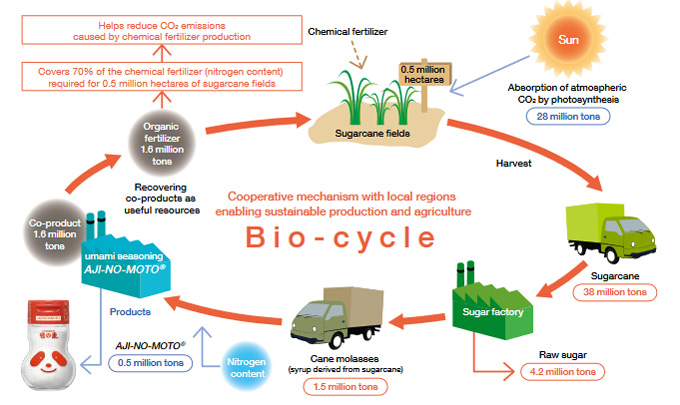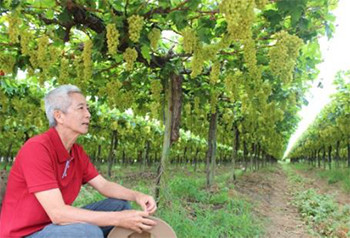Contributing to Sustainable Agriculture Through Bio-Cycle
Ajinomoto Co., Inc.
| Updated | July 23, 2018 (Posted on January 25, 2023) |
|---|---|
| Publication date | February 16, 2018 |
| Sector | Agriculture, Forestry, Fisheries |
In many developing countries where agriculture is a key industry, climate change is causing a decline in arable farmland which raises concerns for the decline in grain production.
The Ajinomoto Group has been employing a resource recycling process (bio-cycle), to expand the choice of arable farmland, improve the quality of agricultural products, and increase profitability by increasing the yield of farmland, while reducing the use of chemical fertilizers (nitrogen content), reducing CO2 emissions in the manufacturing sector, and reducing waste in the production process.
Company Overview

Established in 1909 as a global food manufacturer. Centered with amino acids and our advanced bioscience and fine chemical technologies, we are expanding our business into feed, pharmaceuticals, and chemical products in addition to seasonings and processed foods. We have been one of the world's largest producers of amino acids produced through a fermentation process, at 18 plants across 9 countries including Asia, Europe and America. Since the 1960s, we have been sustainable production and supply/value chains that restore and enhance natural capital by employing bio-cycles around the world.
We were awarded Eco Products Grand Prize “The Minister of Agriculture, Forestry and Fisheries Prize” in 2016, and has also been included in FTSE4GOOD since 2004 and the DJ Sustainability Index since 2014.
Adaptation Initiatives
[Products and Technologies]
- Bio-cycle:
- A regional recycling system that effectively utilizes 99% of the nutrient-rich co-products (copro) as fertilizer and feed for livestock. Co-products are left behind after amino acids are extracted from agricultural crops through the fermentation process that uses raw materials that are readily available. In Brazil, coproducts (generated in the process of producing amino acids from molasses purchased from sugar mills) are processed into organic fertilizers and returned to the sugarcane or grape fields. Sugarcane and grapes will grow again, and the recycling cycle of resources will continue.
- Lower resource fermentation technology:
- A lower resource fermentation technology that utilizes advanced biotechnology to reduce the use of raw materials such as sugar and the volume of wastewater.
[Project Details]
Since the 1960s, the Ajinomoto Group has been practicing bio-cycle to ensure stable procurement of amino acid raw materials in local communities, and it has been introduced at plants around the world. It was employed since the beginning of the operation of our plant in Brazil, which is one of our largest plants in the world.
Bio-cycle is a business model to restore and enhance natural capital by recycling resources. In Brazil, we have succeeded in recycling 99% of the co-products (copro) from the amino acid fermentation process by selling them to local farmers as feed for livestock and organic fertilizer, and returning them to farmland. In May 2012, we installed a biomass boiler and expanded it to a "energy bio-cycle" that uses bagasse as energy resource. In 2014, we were able to stably procure approximately 40% of the energy used at our plants from biomass fuel.

The model above assumes the global production volume of AJI-NO-MOTO®(umami seasoning) in one year to be 500,000, and all of the raw materials to be sugarcane.

Compiled from "Fiscal Year 2017 Climate Change Adaptation Effect Visualization Project (Contribution visualization project of Japanese enterprises in the adaptation field in developing nations)” by the Ministry of Economy, Trade and Industry of Japan.

